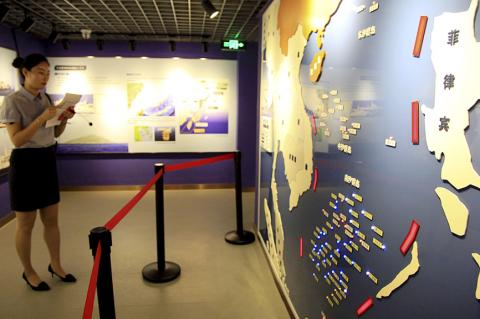President Tsai Ing-wen’s (蔡英文) administration has reached an internal resolution on Taiwan’s territorial claims over the South China Sea, which stresses the nation’s sovereignty over islands in the area, but makes no mention of the so-called “U-shaped line” and “historical waters,” a Presidential Office source said yesterday.
The government wants to differentiate Taiwan’s claims from China’s and avoid the impression that Taipei and Beijing have a unified stance on the issue, said the source, who asked not to be identified.
The U-shaped line — also known as the “11-dash line” — was featured in the “Location Map of the South China Sea Islands” drawn up by the Republic of China (ROC) government in 1947. After the Chinese Nationalist Party (KMT) lost the Chinese Civil War and fled to Taiwan, the Chinese Communist Party changed it to a “nine-dash line.”

Photo: Chinatopix via AP
After the Permanent Court of Arbitration in The Hague, Netherlands, on Tuesday ruled that Beijing’s claims of historical rights over the area based on its nine-dash line were invalid, the Ministry of the Interior and the Mainland Affairs Council issued statements stressing the ROC’s sovereignty over the South China Sea islands.
However, neither statement mentioned the U-shaped line or historical waters, although both referred to the map. That sparked speculation that the government has dropped the U-shaped line claim.
The source said the government’s position is clear: The ROC has sovereignty over South China Sea islands, including Itu Aba Island (Taiping Island, 太平島), and there is no need to mention the U-shaped line or historical waters to assert that position.
Another source said that when the map was drawn in 1947, it only marked the names and locations of the South China Sea islands and 11 demarcation lines, but terms like the “U-shaped line” or “11-dash line” did not exist then.
The demarcation lines were later referred to as the “11-dash line,” and after China proposed the “nine-dash line,” academics created the term U-shaped line to stress the similarity between Taiwan’s and China’s claims.
The term, like the so-called “1992 consensus,” was created and fashioned in retrospect, the source said.
A report by the US Department of State mapped the nine-dash line and 11-dash line and found that they represented different coordinates, suggesting they were different demarcation lines, the source said.
The Presidential Office source questioned the nature of the 11 demarcation lines on the map, saying there are no clear definitions on whether they represent national boundaries, island demarcation lines or historical territorial waters.
Neither the 11-dash line nor the U-shaped line is official terminology or a legal term, the source said.
When asked whether the Tsai administration has made it a policy not to mention the U-shaped line, Presidential Office spokesman Alex Huang (黃重諺) did not give a direct response at a routine news conference yesterday afternoon.
“The ROC government stands firm on its claim of sovereignty over islands in the South China Sea and their relevant waters, which are rightfully our rights in accordance with international law,” Huang said.
Huang said that all relevant documents, including those dating back to 1947, when the ROC government drew the map, show that the official name used is “islands in the South China Sea (南海諸島).”
Additional reporting by Stacy Hsu

CHAOS: Iranians took to the streets playing celebratory music after reports of Khamenei’s death on Saturday, while mourners also gathered in Tehran yesterday Iranian Supreme Leader Ayatollah Ali Khamenei was killed in a major attack on Iran launched by Israel and the US, throwing the future of the Islamic republic into doubt and raising the risk of regional instability. Iranian state television and the state-run IRNA news agency announced the 86-year-old’s death early yesterday. US President Donald Trump said it gave Iranians their “greatest chance” to “take back” their country. The announcements came after a joint US and Israeli aerial bombardment that targeted Iranian military and governmental sites. Trump said the “heavy and pinpoint bombing” would continue through the week or as long

TRUST: The KMT said it respected the US’ timing and considerations, and hoped it would continue to honor its commitments to helping Taiwan bolster its defenses and deterrence US President Donald Trump is delaying a multibillion-dollar arms sale to Taiwan to ensure his visit to Beijing is successful, a New York Times report said. The weapons sales package has stalled in the US Department of State, the report said, citing US officials it did not identify. The White House has told agencies not to push forward ahead of Trump’s meeting with Chinese President Xi Jinping (習近平), it said. The two last month held a phone call to discuss trade and geopolitical flashpoints ahead of the summit. Xi raised the Taiwan issue and urged the US to handle arms sales to

State-run CPC Corp, Taiwan (CPC, 台灣中油) yesterday said that it had confirmed on Saturday night with its liquefied natural gas (LNG) and crude oil suppliers that shipments are proceeding as scheduled and that domestic supplies remain unaffected. The CPC yesterday announced the gasoline and diesel prices will rise by NT$0.2 and NT$0.4 per liter, respectively, starting Monday, citing Middle East tensions and blizzards in the eastern United States. CPC also iterated it has been reducing the proportion of crude oil imports from the Middle East and diversifying its supply sources in the past few years in response to geopolitical risks, expanding

Pro-democracy media tycoon Jimmy Lai’s (黎智英) fraud conviction and prison sentence were yesterday overturned by a Hong Kong court, in a surprise legal decision that comes soon after Lai was jailed for 20 years on a separate national security charge. Judges Jeremy Poon (潘兆初), Anthea Pang (彭寶琴) and Derek Pang (彭偉昌) said in the judgement that they allowed the appeal from Lai, and another defendant in the case, to proceed, as a lower court judge had “erred.” “The Court of Appeal gave them leave to appeal against their conviction, allowed their appeals, quashed the convictions and set aside the sentences,” the judges